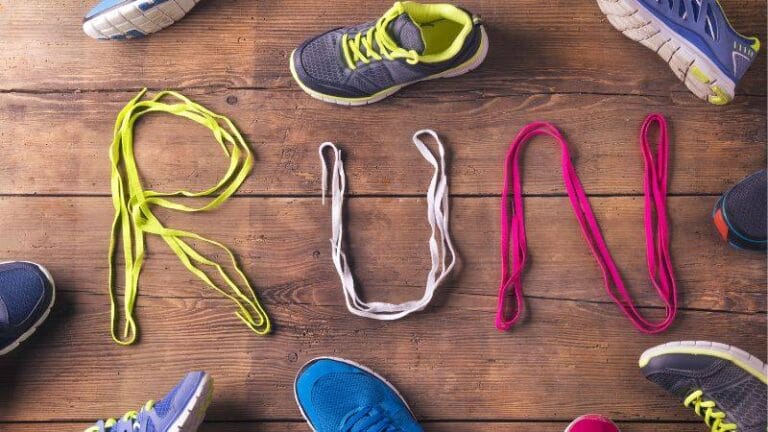Running shoes aren’t just about performance anymore — they’re about purpose.
Choosing the right pair of sustainable running shoes lets you hit the pavement without leaving a heavy footprint on the planet. But here’s the thing — not all eco-friendly footwear is created equal. Some brands focus on recycled materials, others on ethical manufacturing or carbon neutrality.
In this guide, we’re diving into the brands that are doing it right — blending comfort, durability, and planet-first practices into every step. Whether you’re a seasoned marathoner or a weekend jogger, these brands show that making greener choices doesn’t mean sacrificing performance.
Let’s meet the frontrunners in sustainable footwear!
Best Sustainable Running Shoes You Should Try
1. Allbirds: Crafting Comfort with Mother Nature in Mind
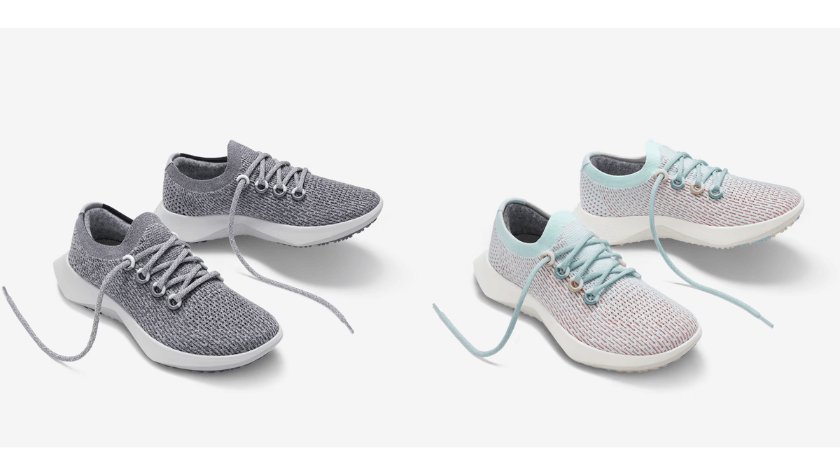
Allbirds has become a household name in sustainable footwear, and their running shoes are no exception. With a focus on natural materials like merino wool and eucalyptus tree fibers, Allbirds is redefining what it means to create eco-friendly footwear.
Their midsoles? Made from sugarcane-based SweetFoam® — a renewable alternative to petroleum-based foam.
Allbirds also keeps a tight grip on its carbon footprint, proudly labeling every product with its carbon impact and offsetting emissions to maintain a carbon-neutral status. For runners seeking both comfort and a lighter environmental step, Allbirds strikes a balance between performance and planet-friendly practices.
2. Merrell: Taking Sustainability to the Trails
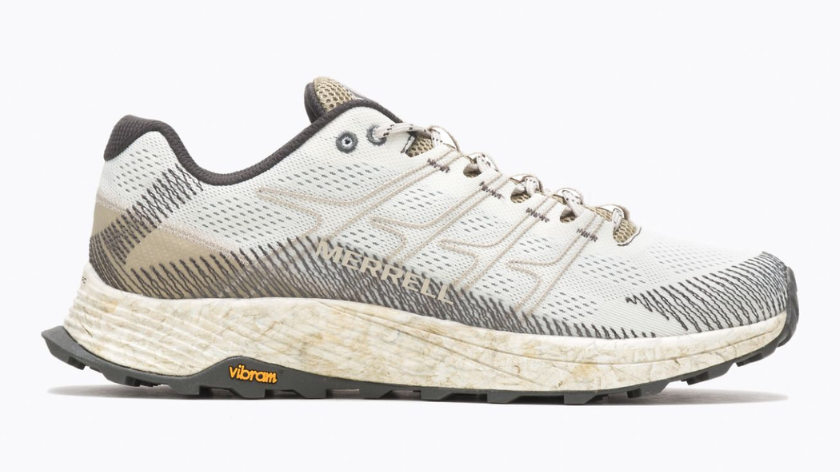
Merrell may be best known for their rugged outdoor gear, but their running shoes reflect the same environmental stewardship. The brand integrates recycled materials into their designs — think reclaimed rubber outsoles and recycled mesh linings. Merrell’s long-standing commitment to durability also shines through, reducing the need for frequent replacements and cutting down on waste.
They’ve partnered with organizations like The Conservation Alliance and 1% for the Planet, reinforcing their ethos of sustainable manufacturing and environmental advocacy. Whether you’re tackling trails or city streets, Merrell’s sustainable running shoes are built to last and lessen your footprint.
3. Adidas x Parley: Turning Ocean Plastic into Performance
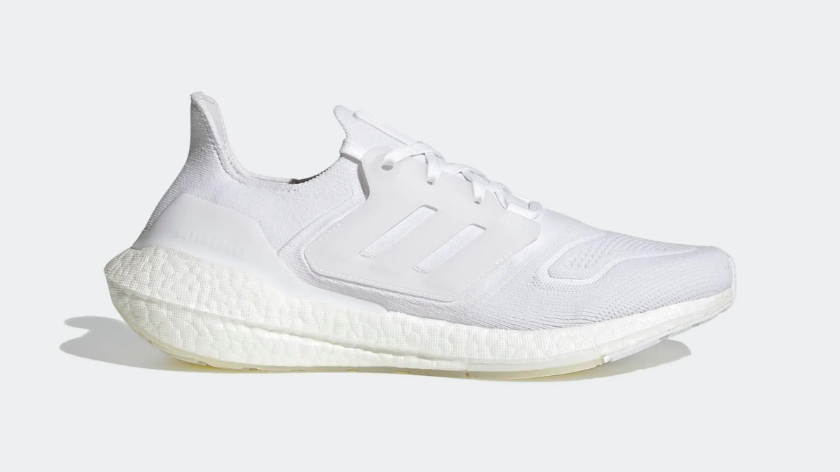
Adidas teamed up with Parley for the Oceans to create a game-changing line of sustainable running shoes made from upcycled ocean plastic. Every pair of Adidas x Parley shoes helps intercept plastic waste before it pollutes marine ecosystems.
These shoes don’t just make a statement — they perform at the highest level, blending recycled materials with Adidas’s signature comfort and technology. The collaboration has already prevented millions of plastic bottles from reaching our oceans, showcasing how innovative design can drive environmental change. If you want to run for a cause, Adidas x Parley makes every stride count.
4. Hylo Athletics: Running Towards Zero Impact
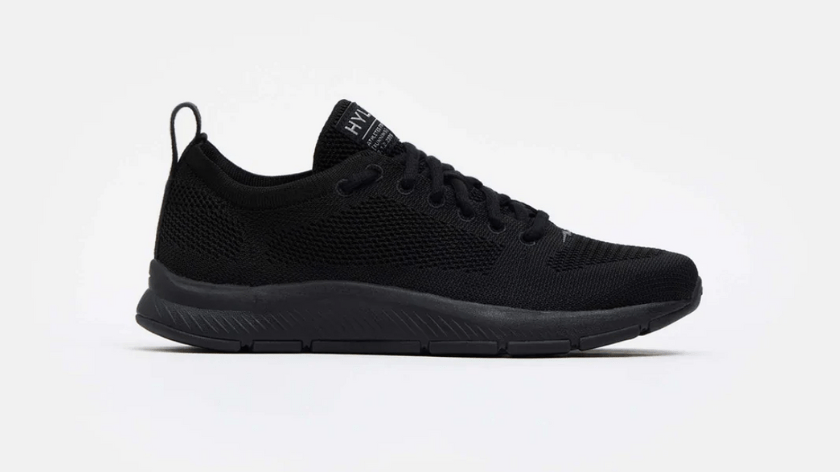
Hylo Athletics is a rising star in the world of sustainable running shoes, embracing a minimalist design with maximum eco-impact. Their shoes feature materials like corn fiber, natural rubber, and algae-based foam, ditching petroleum-based synthetics altogether.
But what really sets Hylo apart is their closed-loop recycling program. When your shoes reach the end of their life, you can return them for recycling — Hylo handles the rest, turning old shoes into new possibilities.
Focused on low-carbon manufacturing and transparent supply chains, Hylo Athletics is redefining what ethical footwear looks like in motion.
What to Look for When Buying Sustainable Running Shoes
When it comes to choosing sustainable running shoes, there are a couple of things that you need to focus on. And it’s not just whether the company used recycled materials and low-energy production processes.
Eco-Friendly Materials
When looking for a sustainable running shoe, diving deep into the lifecycle and eco-friendly materials used is key. Often, we think about recycled plastics, recycled polyester, and plant-based products as the go-to solutions for reducing environmental impact. Yet, the innovation doesn’t stop there.
Consider Adidas’s partnership with Parley, where they turn ocean plastics—once harmful to marine ecosystems—into the very fabric of their running shoes. This strategy supports ocean cleanup efforts while creatively repurposing the waste. But the journey towards sustainability pushes even further with some brands striving to create shoes that are fully recyclable, challenging the status quo of materials destined for landfill.
Moreover, the pursuit of eco-friendly materials goes beyond just recycling. Whether it involves wool, organic cotton, or algae foam, the focus is on ensuring these materials are harvested sustainably. Many brands now work closely with farming organizations that certify these sustainable practices, aiming to lessen the eco-footprint from the supply chain to your feet.
Understanding the difference between materials—like recycled polyester versus algae foam—can empower you as a consumer to make informed decisions. Recycled polyester reuses existing plastics, whereas algae foam represents a renewable resource that’s less taxing on our planet’s resources.
Reflecting on the tangible impact of these sustainable choices, it’s evident that initiatives like recycling ocean plastics not only clean our seas but also curb the demand for new, virgin plastics in the shoe industry.
By choosing shoes made from eco-friendly materials and produced through responsible practices, we play a part in promoting environmental sustainability. Every step taken in a sustainable running shoe is a step towards a more sustainable world. Let your choices reflect your commitment to our planet’s health, and together, we can make a significant difference.
Company Ethics
Eco-friendly running shoes must come from companies that don’t just stop at the product level but also embody significant improvements in their overall ethical standards. It’s essential that the effort to produce sustainable footwear isn’t isolated. If a company releases a sustainable line while the bulk of its products and practices lag behind, the effort feels disingenuous. True ethical commitment means setting ambitious, continuous improvement goals for sustainable and ethical manufacturing across the entire product range.
Moreover, the scope of these ethics shouldn’t be limited. It must encompass workers’ rights, extending protections and fair practices to all direct employees and, ideally, setting standards for suppliers as well. This comprehensive approach gives you, as a consumer, peace of mind when investing in new running shoes.
However, identifying companies that genuinely practice what they preach requires a bit of diligence. Look for those that not only claim sustainability but also transparently share their policies and progress. Companies like Patagonia, for instance, not only advocate for environmental sustainability but also actively engage in fair labor practices and transparency, setting a benchmark for what ethical manufacturing looks like.
But it’s not just about the internal practices of these companies. The broader impacts, such as reduced waste and a smaller carbon footprint, showcase the environmental benefits of ethical manufacturing. As consumers, we can support this shift by choosing brands that offer clear, transparent information about their manufacturing processes and labor practices. Asking questions, reading sustainability reports, and understanding certifications can guide us toward making more ethical choices.
Acknowledging the challenges is also vital. Ethical manufacturing can be more expensive, but it’s an investment in a better world. Companies that overcome these challenges not only lead by example but also demonstrate that profitability and ethics can coexist.
In essence, when looking for eco-friendly running shoes, delve deeper into the company’s ethics, not just its products. By supporting brands that are committed to both environmental sustainability and social responsibility, you contribute to a movement that values our planet and its inhabitants equally. Your choices have power—use them to advocate for a better, more sustainable and ethical world.
Supply Chain And Labor Practices
In discussing the importance of supply chain and labor practices, it’s crucial to recognize that the sustainability of a product is deeply intertwined with the ethics of its sourcing and production. Simply using sustainable materials falls short if those materials are procured from countries or companies notorious for exploiting workers. The fashion industry, with its extensive influence, holds significant power in advocating for better practices among suppliers.
Furthermore, the journey of materials to factories and the final products to consumers also demands attention. The environmental impact of transporting these goods is substantial, underscoring the need for setting ambitious carbon-neutral goals throughout the supply chain. This commitment should stand shoulder to shoulder with initiatives like using recycled polyester and plastics.
Yet, acknowledging these issues is only the first step. Concrete examples of progress, such as brands that have successfully integrated ethical sourcing while achieving carbon neutrality in logistics, serve as beacons of what’s possible. These success stories not only inspire but also set a benchmark for the rest of the industry.
However, the responsibility doesn’t end with corporations. As consumers, we wield considerable influence through our purchasing choices. By favoring brands that transparently commit to ethical practices and environmental stewardship, we signal to the market that sustainability and ethics are non-negotiable.
Moreover, understanding the broader implications of inaction—such as the exacerbation of global inequalities and environmental degradation—can galvanize us to demand change. Strategies for achieving carbon neutrality, from renewable energy in manufacturing to innovative logistics, are within reach and exemplify the forward-thinking needed to transform the industry.
Lastly, familiarizing ourselves with global standards and certifications that monitor ethical sourcing and labor practices can guide us in making informed decisions. These benchmarks help sift through the noise, identifying brands that truly commit to making a difference.
Certifications
Increasingly, companies are recognizing the value of becoming B-corp certified, a status awarded to businesses that demonstrate a high commitment to environmental sustainability, ethical production practices, and prioritizing workers’ rights over profit margins. This certification is not just a badge; it’s proof of a company’s dedication to doing good, involving a rigorous assessment process that evaluates their impact on their workers, customers, community, and the environment.
Similarly, the Fair Trade certification plays a crucial role in ensuring that companies source natural materials responsibly. This certification means that the companies support fair and equitable treatment of farmers and small producers in developing countries. By choosing products from these certified sources, your purchase contributes to reducing poverty and supporting sustainable development in these regions.
However, it’s essential to dive deeper into what these certifications mean. For example, B-corp certification requires companies to meet strict standards of social and environmental performance, accountability, and transparency. Knowing this can help you understand the significance of supporting such businesses.
While these certifications are impactful, they’re not without challenges. The process of obtaining them can be costly and complex, which might deter some companies. Furthermore, as consumers, we should be aware of and question the authenticity of these labels to avoid falling for greenwashing tactics—where companies falsely claim sustainable practices.
Encouragingly, many companies have successfully embraced these certifications, becoming leaders in ethical business practices. Supporting these companies can make a real difference. When shopping for running shoes, or any other product, taking a moment to check for B-corp or Fair Trade certifications can be a step towards making a positive impact.
Recyclability
The conversation around sustainable running shoes has, for a long time, centered on using recycled plastics and polyester. This focus taps into the benefits of the circular economy and helps dodge the bullet of virgin plastic usage. However, the sustainability journey doesn’t end here. It’s crucial to also zoom in on what happens to these shoes at the end of their life. Previously, the mix of various materials in sports footwear, including non-recyclable ones, has led to a dead end for recycling efforts, creating products that are often impossible to reintegrate into the circular economy.
Looking forward, the path to improvement involves not just selecting materials that are friendlier to the planet but also choosing those that can gracefully return to the cycle once their running days are over. The challenge with mixed-material shoes is that they complicate recycling processes, often rendering the entire product non-recyclable.
However, the tide is turning. Some companies are leading the charge by rethinking design from the ground up, focusing on single-material use or developing shoes that can be easily disassembled at the end of their life. This approach not only simplifies recycling but also sets a new standard for the industry.
But what can we, as consumers, do? It’s about making informed choices. Opt for brands that are transparent about their materials and their end-of-life plans for products. Participate in take-back or recycling programs where available, and advocate for more sustainable practices within the industry.
The environmental toll of non-recyclable footwear is not negligible. From contributing to landfill waste to increasing the demand for new, virgin materials, the impact is far-reaching. By supporting innovation in design and materials that consider the end-of-life phase, we can help mitigate these effects.
Vegan Suitable
When considering the impact of our footwear choices, turning our attention to certified vegan running shoes offers a meaningful way to align with higher sustainability standards. These shoes guarantee that no animal-derived materials were used and that no animals were harmed in their testing processes. It’s an approach that champions ethical considerations without compromising on quality or performance.
Even if you, like me, aren’t vegan, preferring vegan running shoes can be a conscious choice reflecting a broader desire to avoid unnecessary harm to animals. This decision doesn’t just echo personal ethics; it also taps into a larger movement towards environmental stewardship and responsible consumption.
Understanding the certifications that mark vegan running shoes, such as those approved by PETA or certified by the Vegan Society, helps ensure that your choices are genuinely in line with these values. These certifications are your guideposts in navigating the market, ensuring the products you choose stand up to rigorous ethical standards.
Beyond ethics, the choice of vegan running shoes speaks volumes about environmental impact. Typically, these shoes are crafted from alternative materials like recycled plastics, plant-based leathers, or other bio-based fabrics, which often have a lower carbon footprint and require less water compared to traditional materials. This shift not only reduces the demand for animal-based products but also encourages innovation in sustainable materials.
By opting for vegan running shoes, we send a clear message to brands about our priorities. The growing demand for ethical and sustainable products drives more companies to consider animal welfare and environmental impact in their product lines, fostering a market where ethical choices become the norm.
What Is The Most Sustainable Running Shoe
My favorite pair of running shoes is the Allbirds Tree Dasher 2. Not only is this one of the most sustainable running shoe brands I have been able to find, but these new running shoes are extremely comfortable and lightweight.
You can hardly feel them on your feet, and the soles provide a great cushioning effect.
Made with all-natural materials and creating a carbon-negative product, you have the full peace of mind that these shoes won’t have a negative impact on the environment.
Order your new pair today and find out how great they are for your running performance.
